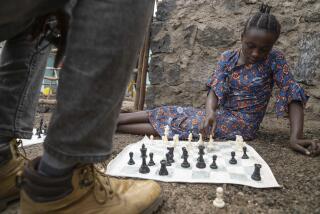Chess Becomes a Gambit to Boost Students’ Reasoning Skills
- Share via
It’s recess. Yet rather than play soccer or tag, the two Montalvo brothers hover over a chess set inside Roosevelt Elementary School’s cafeteria in Santa Ana. “Dang,” says 8-year-old Ken as his older brother John knocks out a knight with a bishop. John, who is 9, rapidly dismantles all but Ken’s king, but the game ends in a stalemate.
Like dozens of other students on campus, the brothers have the chess bug. Ever since the school hired a chess instructor last year, the brothers have played the game before class, during recess, at lunch and after school. Here it is not unusual to see 25 games of chess in progress at once.
Chess is gaining a following at many campuses nationwide as more educators introduce the game to students, hoping to foster such traits as logic, concentration, patience and objective thinking.
“Chess helps children to look ahead and to plan and see the consequences of their ideas,” said Michael Cavallow, executive director of the U.S. Chess Federation. “That’s all very useful. . . . Teachers are starting to know this.”
Schools in such countries as Russia, Yugoslavia and Hungary have a long-standing practice of introducing chess in the schools. That practice has caught on more slowly in the United States but has become more widespread the past decade.
In addition, Cavallow said, youth membership in the federation has increased steadily. When he joined the group 34 years ago at the age of 14, about 95% of members were adults. Of the more than 80,000 members today, more than half are in the two scholastic categories for those under 14 and under 19 years old.
Some schools have hired full-time chess instructors. Others, such as Roosevelt, have hired instructors for a set number of lessons.
Roosevelt Principal Nadine Rodriguez decided she wanted chess for her students, who live in a predominantly Latino, blue-collar neighborhood, after watching an interview on C-SPAN. The interviewer asked the chief executive of a major corporation with an MBA from Harvard what in his background most prepared him for his position. Chess, the man replied.
That clinched it for Rodriguez, who wanted to bring out the traits in her students that would help them succeed.
“If they can anticipate and think ahead, those are the things that are going to help them in the course of a day in academia,” Rodriguez said. “Chess does enforce a lot of what we ask of our students in schools.” Some critics argue, though, that it’s not that chess develops smarts or planning abilities, but that the game attracts those who already possess such qualities.
Yet one study in 1996 sponsored by Intel Corp. compared the reading scores of students who were given chess lessons with those who were not. It concluded that those receiving lessons made more gains in reading than the others.
During the study, educational psychologist Stuart Margulies examined third- and fourth-grade students at four inner-city public schools in Los Angeles and one in New York. In each school, he studied two classrooms. Students in both rooms had similar reading levels and were unaware they were part of a study. One classroom later received chess lessons and the other did not. By the end of the year, the chess-playing groups had made moderate gains over the other students on standardized reading tests.
It’s hard to prove too much in one year, but Margulies said he concluded that “chess helps slightly” with reading skills.
Although the relationship between chess and academic achievement is a subject of continuing research, some teachers say they have seen the benefits.
One of Roosevelt’s fifth-grade teachers, Chad Hammitt, oversaw the chess program last year. During his reading sessions, he said, he has noticed that his chess students have become better at anticipating what will happen in a story. “I think that’s something that’s very difficult, especially for elementary school students, who tend to think more about the present moment,” Hammit said.


